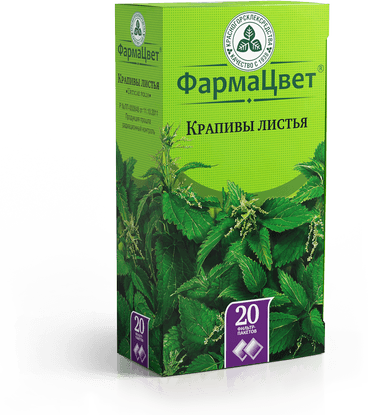Nettle (Urticaе folia)
$4.00 inc. VAT
Nettle (Urtica dioica), also known as Stinging Nettle or Nettle leaf, is a member of the Urticaceae family that grows all over the world.
This herb has a long history of medicinal use. In ancient Greece, nettle was used as a diuretic and a laxative by physicians Galen and Dioscorides. And in Russia, nettle has always been treated with great respect as it was used for its healing effects, for its nutritious value and it was also used to make clothes.
Nettle’s most popular use has always been the tea from its leaves, which has natural blood-clotting properties. It’s also proven to benefit skin, bone and general health as well.
So how can this stinging plant that seems like something to stay away from, become a medicinal go-to? Let’s find out.
Therapeutic Properties of Nettle
Nettle is a very valuable multivitamin plant: its leaves have twice as much ascorbic acid than black currant berries do, the carotene amount in them is higher than in carrots, and they contain vitamin K, vitamin C and vitamins of groups B.
Vitamin K is probably the most important one, as it improves blood clotting, therefore giving Nettle the ability to stop heavy bleeding. Because of it, Nettle is widely used in gynecology.
Ascorbic acid is involved in metabolic processes and increases immunity, and carotenoids are natural antioxidants and immunostimulants.
This herb also includes tannins, which exhibit astringent, hemostatic & anti-inflammatory properties, can bind and remove toxins, clearing the intestines; and formic acid, which exhibits antibacterial, analgesic, anti-inflammatory and healing properties.
Storage and Handling
Store Nettle leaves in the original package, in a dry, dark place; store the boiled infusion in a cool place for no more than 2 days. Keep out of the reach of children!
Shelf Life
3 years. Do not use after expiration date.
Manufacturer/Claims:
JSC “Krasnogorskleksredstva”
Main Uses of Nettle
The main effect of Nettle is blood-clotting, so it’s widely used in:
- Female reproductive system disorders: heavy menstrual flow, menstrual pain, menstrual cycle disorders and cervical erosion;
- Blood disorders, i.e. anemia; decreased platelets, red blood cells and hemoglobin;
- Reduces bleeding due to gingivitis, periodontitis and stomatitis; it also strengthens the gums.
Other Uses
- Helps control blood sugar in patients with diabetes and obesity;
- Treats disorders of the kidneys and urinary tract;
- Treats constipation or diarrhea, hemorrhoids, indigestion, liver and biliary tract disorders;
- Enhances immunity, helps in the prevention of colds and relieves the symptoms of arthritis and tendonitis;
- Improves cardiovascular system and helps in the treatment of atherosclerosis.
Nettle and Pregnancy
Nettle stimulates contractions in pregnant women: while it may be beneficial during labor, it may cause a miscarriage if used before that.
On the other hand, Nettle helps to stop after-birth bleeding, contracts the uterus to its previous shape, and promotes lactation.
Consult your doctor before using.
Nettle in cosmetology
Compresses and baths from the infusion of nettle help treat skin disorders, wounds, burns, insect bites. Its infusion, due to its anti-inflammatory properties, effectively cleans the pores. It is an excellent remedy for ulcers, acne, boils, skin rashes.
Rinsing your hair with Nettle infusion stimulates hair growth, strengthens hair roots, gives it shine, health and beauty. It can also help with dandruff, especially if the problem arises due to the increased oiliness of the scalp.
Nettle in dietotherapy
This herb has a diuretic property and therefore helps to get rid of excess fluid in the body. Nettle tea helps reduce appetite, because it contains substances that dull the feeling of hunger.
Contraindications
- Hypersensitivity to any Nettle component;
- Varicose veins and thrombophlebitis;
- Hypertension, problems with blood clotting;
- Renal and heart failure;
- Gynecological diseases (polyps, uterine tumors).
Side Effects
- Possible allergic reactions;
- Hypercoagulation (if used in unrecommended dosage);
- Nausea, upset stomach (if used internally).
Special Instructions
Nettle interacts with the following medications:
- Blood thinners: warfarin, clopidogrel and aspirin, because Nettle promotes blood-clotting. Taking Nettle can decrease the effects of these drugs.
- Diabetic drugs: Nettle affects blood sugar and interferes with controlling diabetes. It can also affect the strength of diabetes drugs and increase the risk of hypoglycemia. Patients may have to change their dosages of medications if they choose to take Nettle.
- Drugs for high blood pressure such as ACE inhibitors, beta-blockers and calcium channel blockers because Nettle can lower blood pressure and strengthen the effects of these drugs.
- Diuretics because Nettle is also a diuretic and when used together can cause dehydration.
- Lithium because of Nettle’s diuretic qualities. It may reduce the body’s ability to remove this drug, resulting in higher than recommended levels of lithium.
- NSAIDs because Nettle can enhance the anti-inflammatory effect of some of them.
- Sedative medications (CNS depressants) such as clonazepam, lorazepam, phenobarbital, and zolpidem because Nettle has sedative properties too, and taking sedatives along with it may decrease psychomotor reactions. Caution should be exercised when driving vehicles, working with mechanisms, etc.
Before using, consult your doctor.
Dosage and Brewing Instructions
Place 4 filter bags (6.0 g) in a glass or enamel bowl, pour 200 ml (⅘ glass) of boiling water over the bags, cover and let steep for 15 minutes, periodically pressing the bags with a spoon, then squeeze the liquid out of them.
Drink 1 tablespoon 3-4 times a day 30 minutes before meals.
Shake the infusion up beforehand.
The course of treatment may vary. Consult your doctor.


Reviews
There are no reviews yet.